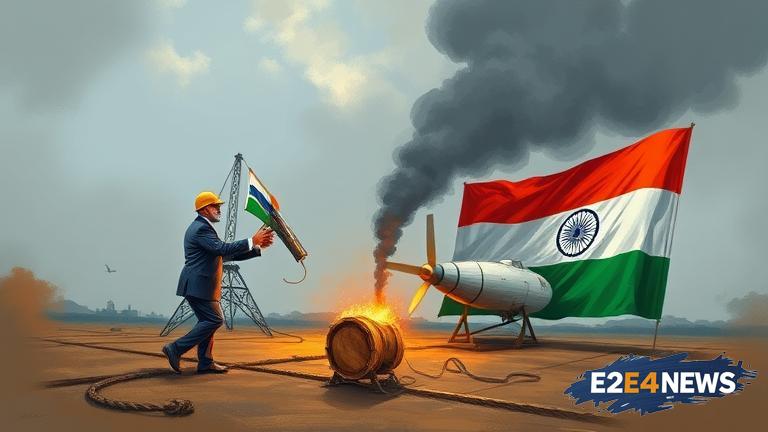The United States has recently imposed tariffs on India, a move that is expected to have significant implications for the trade relationship between the two nations. This development comes at a time when the US is also quietly discussing energy deals with Russia, a country that has been subject to intense international scrutiny and sanctions in recent years. The tariffs imposed on India are part of a broader effort by the US to address what it perceives as unfair trade practices and to protect its domestic industries. However, the fact that the US is simultaneously engaging in talks with Russia on energy cooperation has raised eyebrows and sparked debate among experts and policymakers. The energy deals being discussed between the US and Russia are believed to be focused on the supply of oil and natural gas, with the US seeking to reduce its dependence on Middle Eastern energy sources. At the same time, the US has been critical of India’s trade policies, including its tariffs on American goods and its alleged failure to provide adequate protection for intellectual property rights. The imposition of tariffs on India is seen as a way for the US to exert pressure on the Indian government to reform its trade practices and to create a more level playing field for American businesses. Despite the tensions between the US and India, the two countries have a long-standing strategic partnership and cooperate closely on a range of issues, including defense and counter-terrorism. The US is also one of India’s largest trading partners, and the two countries have a significant volume of bilateral trade. However, the tariffs imposed by the US are likely to have a negative impact on Indian exporters, who will face higher costs and reduced competitiveness in the US market. The Indian government has expressed disappointment and concern over the US tariffs, and has vowed to take retaliatory measures to protect its domestic industries. The quiet discussions between the US and Russia on energy deals have also sparked concern among European countries, which are heavily dependent on Russian energy supplies. The US has been seeking to reduce Europe’s dependence on Russian energy, and has been promoting the development of alternative energy sources, such as liquefied natural gas. The talks between the US and Russia on energy cooperation are seen as a significant development, given the strained relations between the two countries in recent years. The US has imposed sanctions on Russia in response to its actions in Ukraine and its alleged interference in the 2016 US presidential election. However, the US has also been seeking to cooperate with Russia on issues such as counter-terrorism and non-proliferation, and the energy talks are seen as a potential area of cooperation. The implications of the US tariffs on India and the energy talks with Russia are far-reaching and complex, and will depend on a range of factors, including the response of the Indian government and the outcome of the energy negotiations. The US tariffs on India are likely to have a negative impact on the Indian economy, particularly in the short term, and may lead to retaliatory measures from the Indian government. The energy talks between the US and Russia, on the other hand, have the potential to reduce tensions between the two countries and to promote greater cooperation on energy issues. However, the talks are also likely to be subject to significant scrutiny and criticism, given the controversial nature of Russia’s actions in recent years. Overall, the US tariffs on India and the energy talks with Russia reflect the complex and often contradictory nature of international trade and diplomacy, and highlight the need for careful consideration and nuanced analysis of the implications of such developments. The situation is being closely watched by trade observers and policymakers around the world, who are seeking to understand the potential consequences of these developments and to identify opportunities for cooperation and collaboration. As the situation continues to evolve, it is likely that there will be significant developments and announcements in the coming weeks and months, and it will be important to stay informed and up-to-date on the latest news and analysis. The US tariffs on India and the energy talks with Russia are just the latest developments in a complex and rapidly changing global trade landscape, and highlight the need for ongoing dialogue and cooperation between nations to address common challenges and to promote mutual understanding and benefit.
